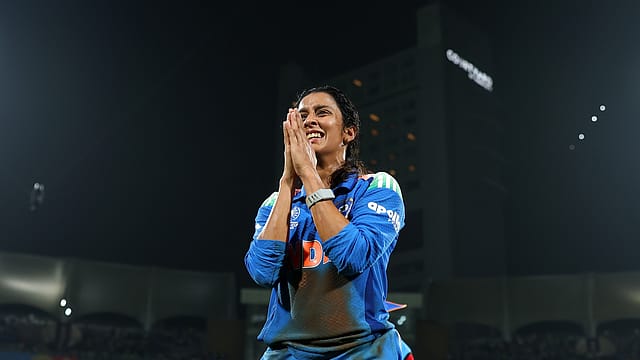World Cup Final Preview: India versus South Africa

When the highest successful chase in the history of women’s cricket (and quite possibly the greatest too) ended at the semifinal stage of a World Cup, it did so with the protagonist falling to her padded knees and burying her face by the side of the DY Patil Stadium pitch. Jemimah Rodrigues was physically exhausted after having played one of the best knocks on the international stage – be it in the women’s sport or men’s – her unbeaten innings of 127 having steered India to victory over defending champions Australia, toppling a target of 339 runs with nine balls to spare.
Then Rodrigues wept, and a nation wept happily with her, at once starting with her captain Harmanpreet Kaur by the dugout, whose 89 runs had also been instrumental in knocking out the seven-time champions and the only unbeaten side of the World Cup so far. Yes, the physical toll of having fielded for 50 overs and having batted for 47 overs, all while anchoring the biggest chase witnessed in the game, played a big role in Rodrigues’s emotions, but the tears were mainly due to her mental fatigue, having played the knock of a lifetime all while being unsure of her place in the side as well as her position in the batting order.
Openomics 2026: Continuity and Conviction
06 Feb 2026 - Vol 04 | Issue 57
The performance state at its peak
In certainly one of the most impassioned presentation ceremony ever witnessed in cricket, a tearful Jemimah received her Player of the Match award while talking about how she ‘was not doing well mentally, going through a lot of anxiety’ right through this long and draining World Cup campaign and also how her belief in her lord, Jesus Christ, ‘carried me through today’. “Towards the end, I was quoting one scripture from the Bible –just stand still and God will fight for you. And I just stood there and he fought for me,” she said, wiping the flow from her eyes on her blue sleeves already drenched in sweat, the front of her shirt caked in mud.
“This is not the end, this is just the beginning,” remarked India’s former captain Anjum Chopra during commentary, just the dose of perspective the moment needed to remind everyone that there was still a World Cup final to be played, and hopefully won. A phenomenal underdog story may have unfolded on Thursday, but it was only the starting point for the grander epic waiting to be told on Sunday, where two teams to have never won a World Cup will take the field in Navi Mumbai: hosts India and South Africa. While previous Indian sides had at least reached the final stage twice before – in 2005 and more recently in 2017, where a few members of the current side continue to wear the scars of defeat after having been on the brink of victory – the women’s Proteas side had done what their men’s side never has, which is to reach an ODI World Cup final.
On Wednesday, the Saffers crushed four-time champions England by 125 runs in the first semifinal in Guwahati, largely due to the brilliance of their captain Laura Wolvaardt, who scored 169 runs herself, the highest individual knock of the tournament, in turn becoming the leading run-scorer across this World Cup with 470 runs. Wolvaardt's genius, coupled with all-rounder Marizanne Kapp's late blitz (she later took wickets too) gave South Africa the highest total posted in a women’s World Cup knock-out game – 319 runs. Only for it to be overshadowed twice on the following day in the second semifinal, first by Australia, whose 338 runs was powered by Phoebe Litchfield’s hundred, followed within hours by India’s 341.
The host nation’s chase began poorly, with Shafali Verma – replacement for the fabulous Pratika Rawal – out leg before in the second over and Smriti Mandhana, the most in-form player in world cricket today, dismissed by the 10th. India had thus far relied on one or both of their openers to urge them to victory, but the lack of it brought together Rodrigues and Kaur, who put together not just one of the great stands ever witnessed of 167 runs, but a future case-study in how partnerships ought to be built. Rodrigues was the enforcer early on, great cuts and square drives sizzling through the packed off-side field repeatedly, even as captain Kaur rotated the strike with long singles. Bigger runs flowed from Jemimah’s bat, until, perhaps due to fatigue, it didn’t. As she slowed down in her 80s, Kaur took over, bashing sixes over midwicket with ease, fast catching up with her partner’s score.
Once Kaur was out just shy of her century in the 36th over, with well over a hundred runs to win, Rodrigues willed her tired hands to take over the bulk of the run-scoring once again. It wasn’t flawless – catches were spilled and run out chances were missed – but she carried on, first by getting to a century that she didn’t celebrate, then a charge laced with undying belief towards the final target. All that effort and prayers, not just Rodrigues’s but a nation’s, pulled India over the victory line to ensure a date against South Africa on Sunday. This also ensured that the World Cup final was a contest between two sides that no one expected, but one that everyone would want to see.
India v South Africa: World Cup final, Sunday, November 2, 3pm.
